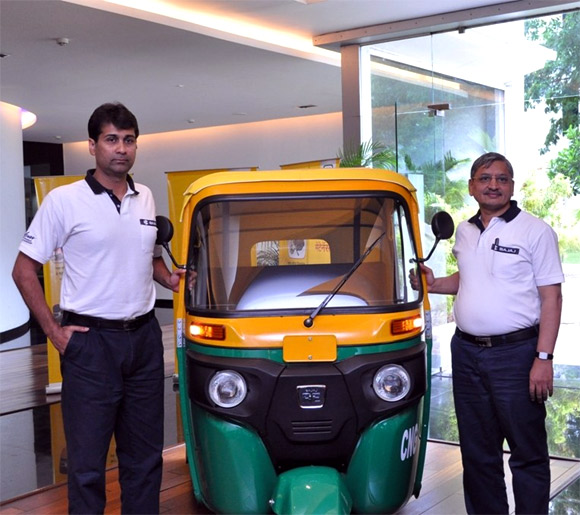
Bajaj Auto has launched a new range of passenger three-wheelers, with improved mileage, changed styling and lower maintenance costs. Called the RE-Compact, the new range would replace the company’s existing range of three-wheelers.
Initially, the company plans to launch seven variants on this three-wheeler platform, with petrol, compressed natural gas and liquefied petroleum gas options. In two to three months, it would add a diesel engine to this line-up. The new three-wheelers are available in two- and four-stroke versions.
The RE-Compact range is priced at a premium of Rs 1,500-2,000 over the existing range.
The company has extended its digital twin-spark ignition (DTS-i) technology, developed for motorcycles, to the new three-wheeler range. This has resulted in a 10-15 per cent improvement in fuel efficiency, compared to the existing range.
R C Maheshwari, president (commercial vehicles), said, “There are issues in urban areas such as congestion and pollution. The new range will address issues such as fuel-efficiency and maintenance…We estimate our customers can save, due to an improvement in fuel efficiency and reduction in maintenance costs. Therefore, if they replace their old vehicles with the RE-Compact, they can increase their incomes up to Rs 20,000 a year.”
The Indian passenger three-wheeler market is estimated at 4,41,000 units, with Bajaj Auto accounting for 51 per cent of it. Last year, at 2,54,000 units, the company’s exports of passenger three-wheelers exceeded domestic sales (2,23,000 units).
Last year, Italian two- and three-wheeler maker Piaggio Vehicles accounted for the second-highest sales in India (1,32,000 units). India’s passenger three-wheeler segment grew nine per cent last year.
To focus on the passenger vehicle front, Bajaj Auto has decided to exit from the cargo three-wheeler space, in which it has products such as GC Max and RE600. With a 53 per cent market share and sales of 51,000 last year, Piaggio was the leader in this segment. Due to the gradual withdrawal of its cargo three-wheelers, in 2012-13, Bajaj Auto sold 2,844 units in this space, a 64 per cent decline, compared with 7,838 units in 2011-12, according to data from the Society of Indian Automobile Manufacturers.
In the past few years, goods-carrying three-wheelers have come under pressure, owing to the introduction of light four-wheelers by Mahindra & Mahindra, Tata Motors and Ashok Leyland. These vehicles offer greater carrying capacity, durability and rigidity.
Last year, the Indian cargo three-wheeler segment reported sales of 97,173 units, an annual fall of nine per cent. The segment accounts for 18 per cent of the overall three-wheeler segment.